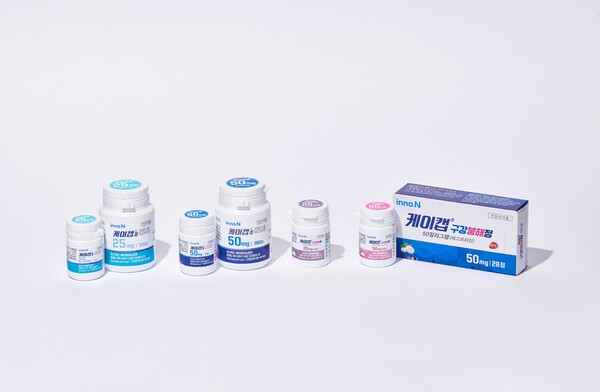Takeda spinoff Phathom Pharmaceuticals has locked down an exclusivity extension for its acid suppressant Voquezna (vonoprazan), pushing generic competition out of the U.S. market until May 2032 and, in the process, clearing a wider runway for Korean pharma HK inno.N’s rival drug K-CAB (tegoprazan) to stake its claim.
On Saturday, local time, the FDA granted Phathom’s citizen petition to update the Orange Book listing for Voquezna, officially recognizing the full 10 years of new chemical entity (NCE) exclusivity.
That means no generics can enter until after May 3, 2032, even though the drug’s substance patent expires in 2028 and may only stretch as far as April 2030.
The FDA’s decision hands Phathom a clean slate to defend its potassium-competitive acid blocker (P-CAB) franchise, including the Triple Pak and Dual Pak H. pylori regimens.
But it also removes a major overhang for HK inno.N, which now finds itself with a rare opportunity: to bring a competing branded P-CAB to a wide-open U.S. market before any generics hit the scene.

K-CAB, licensed to Sebela Pharmaceuticals in 2021, has already completed its pivotal phase 3 TRIUMpH trial in the U.S., meeting both primary and secondary endpoints in patients with erosive esophagitis (EE) and non-erosive reflux disease (NERD).
An FDA submission covering both indications is slated for the fourth quarter of 2025, positioning the drug for potential approval and launch as early as 2027.
That timing would have previously put K-CAB up against not just Voquezna, but also lower-cost generics. Now, the market is clear of that risk.
“This eliminates concerns about the entry and expansion of P-CAB class drugs in the U.S.,” an HK inno.N spokesperson told Korea Biomedical Review in a Tuesday note. “It’s a highly significant development expected to positively influence the U.S. market entry of our own drug, K-CAB.”
Phathom’s exclusivity win stems from a December 2024 petition requesting the FDA recognize full NCE exclusivity not just for Voquezna’s acid suppression indication, but also for its use in Helicobacter pylori treatment. The FDA agreed, effectively granting Voquezna exclusivity across all approved indications.
While HK inno.N still expects K-CAB to receive five years of market protection post-approval, which is standard under NCE rules, analysts see the shift in Phathom’s status as a tailwind.
“If Voquezna’s exclusivity hadn’t been extended, K-CAB would have faced branded and generic competition in 2027,” Samsung Securities wrote in a report Monday. “Now, it has a chance to capture meaningful shares before any generics arrive.”
The firm raised its valuation of K-CAB by 27 percent to 394.6 billion won ($291 million), citing the removal of early generic risk and the drug’s clinical edge. Tegoprazan outperformed PPIs not only in EE healing at two and eight weeks, but also across all EE severity grades (LA A through D). In NERD, it resolved not just heartburn but also acid regurgitation, a result competing drugs failed to deliver.
“Based on clinical results that demonstrate K-CAB’s best-in-class potential among P-CABs, our strategy will be to differentiate it from vonoprazan and aggressively target the market,” the HK inno.N spokesperson said.
Sebela is also running a separate phase 3 EE maintenance study, with data expected in the third quarter. That readout will support the planned NDA.
Pricing will be key. According to analysts, Voquezna is currently sold at around $22 per pill, while Nexium (esomeprazole), a proton pump inhibitor (PPI), goes for roughly $9. With K-CAB aiming to bridge the two classes, some expect its price point to land somewhere in between.
Investors are already reacting. HK inno.N shares jumped 14.5 percent to 46,950 won ($34.62) on Monday, and hovered near that level at 47,000 won Tuesday morning.
The company also continues expanding overseas. In May, HK inno.N entered six new markets across Africa and the Middle East, bringing its K-CAB footprint to 54 countries excluding Korea. It aims to reach 100 by 2028. “Surpassing the halfway mark toward our goal of 100 countries is a major milestone,” CEO Kwak Dal-won said in a recent statement.
Related articles
- HK inno.N wins phase 3 nod for eczema drug in dogs to take on Zoetis' Apoquel
- Onconic swings to profit in Q1 as Jaqbo sales hit 10 bil. won in 6 months
- Daewon Pharm moves GERD drug DW4421 into phase 3 trials
- HK inno.N’s K-CAB tops standard acid treatment in US reflux trials, FDA filing next
- HK inno.N becomes largest shareholder of Japan’s RaQualia to boost R&D, K-CAB expansion
- Takeda’s market exit and return of vonoprazan raise stakes in Korea’s drug pricing battle
- HK inno.N fends off generics in K-CAB patent clash, securing 2nd win in court

